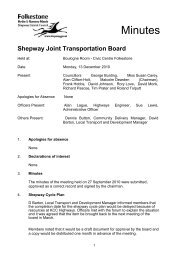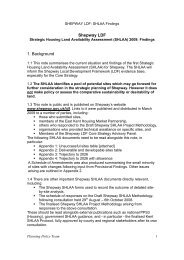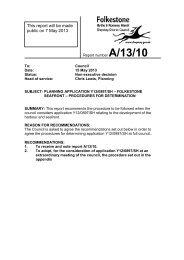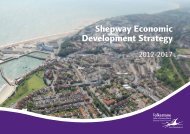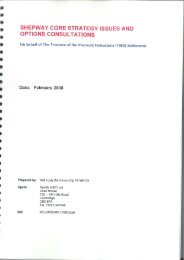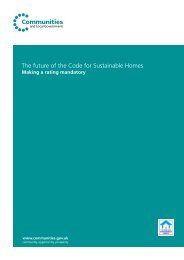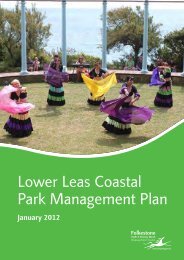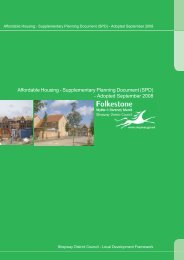Review of Planning Policy Guidance Note 21 (PPG21) on tourism ...
Review of Planning Policy Guidance Note 21 (PPG21) on tourism ...
Review of Planning Policy Guidance Note 21 (PPG21) on tourism ...
Create successful ePaper yourself
Turn your PDF publications into a flip-book with our unique Google optimized e-Paper software.
Publicati<strong>on</strong> title: <str<strong>on</strong>g>Review</str<strong>on</strong>g> <str<strong>on</strong>g>of</str<strong>on</strong>g> <str<strong>on</strong>g>Planning</str<strong>on</strong>g> <str<strong>on</strong>g>Policy</str<strong>on</strong>g> <str<strong>on</strong>g>Guidance</str<strong>on</strong>g> <str<strong>on</strong>g>Note</str<strong>on</strong>g> <str<strong>on</strong>g>21</str<strong>on</strong>g> (PPG<str<strong>on</strong>g>21</str<strong>on</strong>g>) <strong>on</strong> <strong>tourism</strong> -c<strong>on</strong>sultati<strong>on</strong>Audience: Local planning authorities, <strong>tourism</strong> industry, <strong>tourism</strong> developersC<strong>on</strong>sultati<strong>on</strong> period: February 2003 to 23 May 2003Price: FreeSummaryThis c<strong>on</strong>sultati<strong>on</strong> paper seeks views <strong>on</strong> the cancellati<strong>on</strong> <str<strong>on</strong>g>of</str<strong>on</strong>g> <str<strong>on</strong>g>Planning</str<strong>on</strong>g> <str<strong>on</strong>g>Policy</str<strong>on</strong>g> Guide <str<strong>on</strong>g>21</str<strong>on</strong>g> (PPG<str<strong>on</strong>g>21</str<strong>on</strong>g>)<strong>on</strong> planning for <strong>tourism</strong> and its replacement with good practice guidance.ORDERThis publicati<strong>on</strong> is out <str<strong>on</strong>g>of</str<strong>on</strong>g> print and <strong>on</strong>ly available <strong>on</strong>line - see below to view.Alternative formats: if you require this publicati<strong>on</strong> in an alternative format (eg Braille, largeprint or audio cassette) please email alternativeformats@communities.gsi.gov.uk quoting thetitle and product code/ISBN <str<strong>on</strong>g>of</str<strong>on</strong>g> the publicati<strong>on</strong>, and your address and teleph<strong>on</strong>e number.<str<strong>on</strong>g>Note</str<strong>on</strong>g>: The above publicati<strong>on</strong> was issued by our former department, the Office <str<strong>on</strong>g>of</str<strong>on</strong>g> theDeputy Prime Minister (ODPM). ODPM became Communities and LocalGovernment <strong>on</strong> 5 May 2006 - all references in the text to ODPM now refer toCommunities and Local Government.C<strong>on</strong>tents<str<strong>on</strong>g>Review</str<strong>on</strong>g> <str<strong>on</strong>g>of</str<strong>on</strong>g> <str<strong>on</strong>g>Planning</str<strong>on</strong>g> <str<strong>on</strong>g>Policy</str<strong>on</strong>g> <str<strong>on</strong>g>Guidance</str<strong>on</strong>g> <str<strong>on</strong>g>Note</str<strong>on</strong>g> <str<strong>on</strong>g>21</str<strong>on</strong>g> <strong>on</strong> TourismIntroducti<strong>on</strong>The Government's ProposalsThe Importance <str<strong>on</strong>g>of</str<strong>on</strong>g> TourismNati<strong>on</strong>al Tourism <str<strong>on</strong>g>Policy</str<strong>on</strong>g>Tourism and <str<strong>on</strong>g>Planning</str<strong>on</strong>g>Good Practice <str<strong>on</strong>g>Guidance</str<strong>on</strong>g> <strong>on</strong> <str<strong>on</strong>g>Planning</str<strong>on</strong>g> for TourismC<strong>on</strong>sultati<strong>on</strong> <strong>on</strong> these proposalsAnnexStatement <str<strong>on</strong>g>of</str<strong>on</strong>g> C<strong>on</strong>sultati<strong>on</strong>
<str<strong>on</strong>g>Review</str<strong>on</strong>g> <str<strong>on</strong>g>of</str<strong>on</strong>g> <str<strong>on</strong>g>Planning</str<strong>on</strong>g> <str<strong>on</strong>g>Policy</str<strong>on</strong>g> <str<strong>on</strong>g>Guidance</str<strong>on</strong>g> <str<strong>on</strong>g>Note</str<strong>on</strong>g> <str<strong>on</strong>g>21</str<strong>on</strong>g> <strong>on</strong> TourismThis letter seeks views and comments <strong>on</strong> the attached c<strong>on</strong>sultati<strong>on</strong> paper proposing thecancellati<strong>on</strong> <str<strong>on</strong>g>of</str<strong>on</strong>g> PPG<str<strong>on</strong>g>21</str<strong>on</strong>g> and its replacement with good practice guidance.The planning green paper, published in December 2001, proposed changes to modernise theplanning system to achieve an improved, simpler, faster and more accessible system that isbetter suited to the needs <str<strong>on</strong>g>of</str<strong>on</strong>g> communities and local ec<strong>on</strong>omies. To help achieve this, a review<str<strong>on</strong>g>of</str<strong>on</strong>g> all nati<strong>on</strong>al planning policy was proposed with the aim <str<strong>on</strong>g>of</str<strong>on</strong>g> producing more c<strong>on</strong>cise policy.More detailed advice <strong>on</strong> how policy can be implemented will be set out in good practice guidessuch as the <strong>on</strong>e <strong>on</strong> <strong>tourism</strong> being proposed here.The Government has an <strong>on</strong>going commitment to the <strong>tourism</strong> industry, which it wishes to seeflourish in resp<strong>on</strong>se to the market. At the same time <strong>tourism</strong> must c<strong>on</strong>tribute to sustainabledevelopment, seeking to balance growth with c<strong>on</strong>servati<strong>on</strong> <str<strong>on</strong>g>of</str<strong>on</strong>g> the envir<strong>on</strong>ment. The aim mustbe to attract visitors while maintaining those features <str<strong>on</strong>g>of</str<strong>on</strong>g> wider and enduring value that help toencourage <strong>tourism</strong> in the first place.Preparati<strong>on</strong> <str<strong>on</strong>g>of</str<strong>on</strong>g> this c<strong>on</strong>sultati<strong>on</strong> paper has taken account <str<strong>on</strong>g>of</str<strong>on</strong>g> the findings from research carriedout <strong>on</strong> behalf <str<strong>on</strong>g>of</str<strong>on</strong>g> the ODPM and through working closely with DCMS who are the leadGovernment Department for <strong>tourism</strong>.The period <str<strong>on</strong>g>of</str<strong>on</strong>g> public c<strong>on</strong>sultati<strong>on</strong> will last for 12 weeks and we invite resp<strong>on</strong>ses by Friday 23May 2003.Preparati<strong>on</strong> <str<strong>on</strong>g>of</str<strong>on</strong>g> good practice guidance and the decisi<strong>on</strong> <strong>on</strong> the subsequent cancellati<strong>on</strong> <str<strong>on</strong>g>of</str<strong>on</strong>g> thecurrent planning policy guidance will take into account the resp<strong>on</strong>ses received to thisc<strong>on</strong>sultati<strong>on</strong> paper.Resp<strong>on</strong>ses, and any questi<strong>on</strong>s about the C<strong>on</strong>sultati<strong>on</strong> Paper, should be directed to:Maxine McLearyODPM <str<strong>on</strong>g>Planning</str<strong>on</strong>g> Policies Divisi<strong>on</strong>Z<strong>on</strong>e 4/H4Eland HouseBressenden PlaceL<strong>on</strong>d<strong>on</strong> SW1E 5DUTeleph<strong>on</strong>e: 020 7944 3962Fax: 020 7944 3949Or by e-mail to: PPG<str<strong>on</strong>g>21</str<strong>on</strong>g>C<strong>on</strong>sultati<strong>on</strong>@communities.gsi.gov.ukIt would be helpful if resp<strong>on</strong>ses from representative groups could give a summary <str<strong>on</strong>g>of</str<strong>on</strong>g> the peopleand organisati<strong>on</strong>s they represent.The ODPM may wish to make resp<strong>on</strong>ses to this C<strong>on</strong>sultati<strong>on</strong> Paper available for publicinspecti<strong>on</strong> in the ODPM Library. We will assume that you do not object to this unless youspecify otherwise. Additi<strong>on</strong>ally a summary <str<strong>on</strong>g>of</str<strong>on</strong>g> resp<strong>on</strong>ses will subsequently be published <strong>on</strong> the
ODPM website.This c<strong>on</strong>sultati<strong>on</strong> is being c<strong>on</strong>ducted in accordance with the Government's Code <str<strong>on</strong>g>of</str<strong>on</strong>g> Practice <strong>on</strong>Written C<strong>on</strong>sultati<strong>on</strong>. The criteria are reproduced in the annex to this c<strong>on</strong>sultati<strong>on</strong> paper. Anyprocedural observati<strong>on</strong>s or complaints about the c<strong>on</strong>sultati<strong>on</strong> exercise should be sent to:Siobhan Benita3/1726 WhitehallL<strong>on</strong>d<strong>on</strong>SW1A 2WHor by e-mail to: Siobhan.Benita@odpm-dft.gsi.gov.ukInformati<strong>on</strong> <strong>on</strong> how and where you can obtain this document and other publicati<strong>on</strong>s producedby the Office <str<strong>on</strong>g>of</str<strong>on</strong>g> the Deputy Prime Minister is available from the ODPM publicati<strong>on</strong>s homepage.Yours faithfullyJ P Channing
Introducti<strong>on</strong>Go to table <str<strong>on</strong>g>of</str<strong>on</strong>g> c<strong>on</strong>tents1. This c<strong>on</strong>sultati<strong>on</strong> paper seeks views <strong>on</strong> the cancellati<strong>on</strong> <str<strong>on</strong>g>of</str<strong>on</strong>g> PPG<str<strong>on</strong>g>21</str<strong>on</strong>g> <strong>on</strong> planning for <strong>tourism</strong>and its replacement with good practice guidance. The criteria that the Government requires tobe applied to all UK nati<strong>on</strong>al public c<strong>on</strong>sultati<strong>on</strong>s in respect <str<strong>on</strong>g>of</str<strong>on</strong>g> documents in electr<strong>on</strong>ic orprinted form have been followed in the preparati<strong>on</strong> <str<strong>on</strong>g>of</str<strong>on</strong>g> this document. They are reproduced inthe Annex to this c<strong>on</strong>sultati<strong>on</strong> paper.2. The planning green paper, published in December 2001, proposed changes to the planningsystem to achieve a better, simpler, faster, more accessible system that better serves bothbusiness and the community. To achieve that change it proposed the review <str<strong>on</strong>g>of</str<strong>on</strong>g> all nati<strong>on</strong>alplanning policy with the aim <str<strong>on</strong>g>of</str<strong>on</strong>g> having a more c<strong>on</strong>cise body <str<strong>on</strong>g>of</str<strong>on</strong>g> guidance providing clearstatements <str<strong>on</strong>g>of</str<strong>on</strong>g> the nati<strong>on</strong>al policy which should be followed. More detailed advice, <strong>on</strong> howpolicy can be implemented, which can be interpreted more flexibly, will be set out in compani<strong>on</strong>documentati<strong>on</strong>.The Government's Proposals3. PPG<str<strong>on</strong>g>21</str<strong>on</strong>g> has now been reviewed in the c<strong>on</strong>text <str<strong>on</strong>g>of</str<strong>on</strong>g> the green paper and research(http://www.planning.communities.gov.uk/rropflat/index.htm) recently undertaken <strong>on</strong> behalf <str<strong>on</strong>g>of</str<strong>on</strong>g>the Department <str<strong>on</strong>g>of</str<strong>on</strong>g> the Envir<strong>on</strong>ment, Transport and the Regi<strong>on</strong>s. The main c<strong>on</strong>clusi<strong>on</strong> <str<strong>on</strong>g>of</str<strong>on</strong>g> thisreview is that planning for <strong>tourism</strong> will be better served by issuing good practice guidance thanby revising PPG<str<strong>on</strong>g>21</str<strong>on</strong>g>. This is because the nati<strong>on</strong>al planning policies that impact <strong>on</strong> <strong>tourism</strong> areactually c<strong>on</strong>tained in other PPGs where the central issues in planning for <strong>tourism</strong> -sustainability, accessibility and locati<strong>on</strong> <str<strong>on</strong>g>of</str<strong>on</strong>g> development - are dealt with. So the policies mostrelevant to <strong>tourism</strong> are not in PPG<str<strong>on</strong>g>21</str<strong>on</strong>g>, but in PPG6 <strong>on</strong> Town Centres, PPG7 <strong>on</strong> TheCountryside and Rural Ec<strong>on</strong>omy and PPG13 <strong>on</strong> Transport. Other PPGs are also <str<strong>on</strong>g>of</str<strong>on</strong>g> relevance -for example PPG2 <strong>on</strong> developments in Green Belts. Bey<strong>on</strong>d the nati<strong>on</strong>al policies outlined inother PPGs it is difficult to argue that <strong>tourism</strong> requires further specific policies at the nati<strong>on</strong>allevel.4. We propose to issue good practice guidance to help authorities and others understand thesignificance to planning for <strong>tourism</strong> <str<strong>on</strong>g>of</str<strong>on</strong>g> these broader principles and messages. So thisguidance could show how key policies should be applied, particularly to derive the ec<strong>on</strong>omicbenefits <str<strong>on</strong>g>of</str<strong>on</strong>g> <strong>tourism</strong> while meeting the other objectives <str<strong>on</strong>g>of</str<strong>on</strong>g> sustainable development. It will alsohelp to overcome the c<strong>on</strong>cern in the <strong>tourism</strong> industry that many local planning authorities lackan understanding <str<strong>on</strong>g>of</str<strong>on</strong>g> the industry.5. <str<strong>on</strong>g>Guidance</str<strong>on</strong>g> should complement detailed policies for <strong>tourism</strong> to be developed at the regi<strong>on</strong>allevel. Tourism is a clear example where regi<strong>on</strong>al and sub-regi<strong>on</strong>al planning could be used toprovide a more detailed planning policy framework. Such a shift towards more detailed policiesat the regi<strong>on</strong>al level would fit well with the regi<strong>on</strong>al approach to <strong>tourism</strong> strategies that alreadyexist.The Importance <str<strong>on</strong>g>of</str<strong>on</strong>g> Tourism6. Travel and <strong>tourism</strong> is a huge industry <str<strong>on</strong>g>of</str<strong>on</strong>g> enormous ec<strong>on</strong>omic importance. Most communities
in the UK feel its effects in some way. As <strong>on</strong>e <str<strong>on</strong>g>of</str<strong>on</strong>g> the largest industries in the UK it:- is worth approximately £74 billi<strong>on</strong> a year, roughly 4.5% <str<strong>on</strong>g>of</str<strong>on</strong>g> GDP and accounts for 6% <str<strong>on</strong>g>of</str<strong>on</strong>g>c<strong>on</strong>sumer spending; supports around 2.1 milli<strong>on</strong> jobs - around 7% <str<strong>on</strong>g>of</str<strong>on</strong>g> all people in employment in Great Britain; c<strong>on</strong>sists <str<strong>on</strong>g>of</str<strong>on</strong>g> 127,000 VAT registered businesses, 80% <str<strong>on</strong>g>of</str<strong>on</strong>g> which are small or microenterprises with a turnover <str<strong>on</strong>g>of</str<strong>on</strong>g> less than £250,000 per annum; and brought in 23 milli<strong>on</strong> overseas visitors to Britain in 2001 and is our largest invisible exportearner.7. A wide range <str<strong>on</strong>g>of</str<strong>on</strong>g> businesses depends in whole or in part <strong>on</strong> <strong>tourism</strong>. These include not <strong>on</strong>lyhotels and other accommodati<strong>on</strong> providers, but also restaurants, shops, theatres, transportbusinesses and attracti<strong>on</strong>s like theme parks and museums. Other sectors such as retailing andc<strong>on</strong>structi<strong>on</strong> also benefit indirectly from <strong>tourism</strong> income.8. Global predicti<strong>on</strong>s are for the volume <str<strong>on</strong>g>of</str<strong>on</strong>g> visitors to grow in the l<strong>on</strong>g-term. In the UK the keytrends are:- c<strong>on</strong>tinued growth in domestic short-breaks, <str<strong>on</strong>g>of</str<strong>on</strong>g> between 1-3 nights, at the expense <str<strong>on</strong>g>of</str<strong>on</strong>g>holidays <str<strong>on</strong>g>of</str<strong>on</strong>g> 8 nights or l<strong>on</strong>ger. 31% <str<strong>on</strong>g>of</str<strong>on</strong>g> domestic holiday trips were classified as 'sec<strong>on</strong>daryholidays' in 1990, but by 1999 this had increased to 60%. a steeper rise in the number <str<strong>on</strong>g>of</str<strong>on</strong>g> visits to towns and cities over other locati<strong>on</strong>s, but in terms<str<strong>on</strong>g>of</str<strong>on</strong>g> overall trips, the seaside is still the largest sector; a growth in leisure day visits; and steady growth in business <strong>tourism</strong> spend, above the overall <strong>tourism</strong> growth rate.Nati<strong>on</strong>al Tourism <str<strong>on</strong>g>Policy</str<strong>on</strong>g>9. The Government's policy, as set out in the Department for Culture, Media and Sport's 1999strategy document Tomorrow's Tourism, is to encourage <strong>tourism</strong> to be world-class in everyrespect. It wishes to see <strong>tourism</strong> grow rapidly and to be harnessed as a driving force inbringing about development that c<strong>on</strong>tributes to the nati<strong>on</strong>'s ec<strong>on</strong>omic, social and cultural wellbeing.This will be facilitated by modernising infrastructure such as hotels, restaurants andtransport links and augmenting it with new infrastructure located to support the l<strong>on</strong>g-termsustainable development <str<strong>on</strong>g>of</str<strong>on</strong>g> the industry.10. However, to ensure sustainability we must also take care <str<strong>on</strong>g>of</str<strong>on</strong>g> the broader fabric <strong>on</strong> which<strong>tourism</strong> in the UK depends - our envir<strong>on</strong>ment, heritage, culture, and the diversity <str<strong>on</strong>g>of</str<strong>on</strong>g> ourlandscape and local communities. So <strong>tourism</strong> growth should be handled carefully to:-
e an element in regenerati<strong>on</strong> projects in many coastal resorts and urban areas, stimulategrowth, develop and attract new businesses and revitalise run down areas; provide much needed training and employment opportunities for large numbers <str<strong>on</strong>g>of</str<strong>on</strong>g> people; c<strong>on</strong>tribute to revitalising rural ec<strong>on</strong>omies and communities; enable the c<strong>on</strong>servati<strong>on</strong> <str<strong>on</strong>g>of</str<strong>on</strong>g> many historic buildings and landscapes that might otherwise belost; c<strong>on</strong>tribute to nature c<strong>on</strong>servati<strong>on</strong> and biodiversity; and foster social inclusi<strong>on</strong> and widen access to culture, heritage and the countryside.Tourism and <str<strong>on</strong>g>Planning</str<strong>on</strong>g>11. The land use planning system has a key part to play in ensuring that <strong>tourism</strong>-relateddevelopment maximises the ec<strong>on</strong>omic and employment benefits that <strong>tourism</strong> can bring, in away that is sustainable and protects those qualities in the envir<strong>on</strong>ment <strong>on</strong> which <strong>tourism</strong>depends. The key issues for sustainable <strong>tourism</strong> development remain c<strong>on</strong>stant and they arethe need to ensure:- new development is sustainable, including the need for sustainable transport links which<str<strong>on</strong>g>of</str<strong>on</strong>g>fer access by a variety <str<strong>on</strong>g>of</str<strong>on</strong>g> modes <str<strong>on</strong>g>of</str<strong>on</strong>g> transport; new <strong>tourism</strong> development appropriately located and sensitively designed; that <strong>tourism</strong> makes a full c<strong>on</strong>tributi<strong>on</strong> to ec<strong>on</strong>omies <str<strong>on</strong>g>of</str<strong>on</strong>g> both urban and rural areas; and the role <str<strong>on</strong>g>of</str<strong>on</strong>g> <strong>tourism</strong> in urban renaissance and the rural ec<strong>on</strong>omy is fully recognised.12. The existing PPG<str<strong>on</strong>g>21</str<strong>on</strong>g>, published in November 1992, c<strong>on</strong>tains much material about thenature <str<strong>on</strong>g>of</str<strong>on</strong>g> the <strong>tourism</strong> industry, its c<strong>on</strong>tributi<strong>on</strong> to the nati<strong>on</strong>al ec<strong>on</strong>omy and the need to protectthe quality <str<strong>on</strong>g>of</str<strong>on</strong>g> the envir<strong>on</strong>ment <strong>on</strong> which <strong>tourism</strong> depends. Very few <str<strong>on</strong>g>of</str<strong>on</strong>g> the messages it c<strong>on</strong>tainsare specific planning policies. PPG<str<strong>on</strong>g>21</str<strong>on</strong>g> does not reflect the more recent policy emphasis <strong>on</strong>sustainability, the urban renaissance agenda or the issues around social inclusi<strong>on</strong>, which arealready c<strong>on</strong>tained in other, more recent, PPGs, and in particular:- PPG13 <strong>on</strong> Transport PPG6 <strong>on</strong> Town Centre and Retail development PPG7 <strong>on</strong> the Countryside PPG2 <strong>on</strong> Green Belts PPG17 <strong>on</strong> Open Space, Sport and Recreati<strong>on</strong>
13. These PPGs will be revised into the new style <str<strong>on</strong>g>Planning</str<strong>on</strong>g> <str<strong>on</strong>g>Policy</str<strong>on</strong>g> Statements (PPSs)proposed in the planning green paper. The aim <str<strong>on</strong>g>of</str<strong>on</strong>g> this process will be to make their policymessages clearer and more c<strong>on</strong>cise. The general benefits <str<strong>on</strong>g>of</str<strong>on</strong>g> this will be enjoyed by the<strong>tourism</strong> industry as much as any other because policy will be more readily understood andimplemented.Good Practice <str<strong>on</strong>g>Guidance</str<strong>on</strong>g> <strong>on</strong> <str<strong>on</strong>g>Planning</str<strong>on</strong>g> for Tourism14. It is most important for the tourist industry that local planning authorities have a goodunderstanding <str<strong>on</strong>g>of</str<strong>on</strong>g> the needs <str<strong>on</strong>g>of</str<strong>on</strong>g> the industry and have advice and guidance to enable them todevelop appropriate policies for <strong>tourism</strong> in development plans (or their successors) and to takethe right decisi<strong>on</strong>s <strong>on</strong> planning applicati<strong>on</strong>s. The existing planning policy guidance gives littleassistance with this. We believe that both planners and the <strong>tourism</strong> industry will reapsubstantial benefits from the provisi<strong>on</strong> <str<strong>on</strong>g>of</str<strong>on</strong>g> up-to-date good practice guidance that addressesissues <str<strong>on</strong>g>of</str<strong>on</strong>g> c<strong>on</strong>cern to planners and <strong>tourism</strong> developers. It will advise <strong>on</strong> how planning policy canbe developed and applied in ways that can benefit the <strong>tourism</strong> industry and meet nati<strong>on</strong>alpolicy objectives.15. We believe that a revisi<strong>on</strong> <str<strong>on</strong>g>of</str<strong>on</strong>g> PPG<str<strong>on</strong>g>21</str<strong>on</strong>g> <strong>on</strong> Tourism, within the parameters set out in theGreen Paper, would do no more than repeat the policy advice already c<strong>on</strong>tained in otherPPGs. Effective good practice guidance, which can be more comprehensive in what itc<strong>on</strong>siders, more practical and more applicable to the problems <str<strong>on</strong>g>of</str<strong>on</strong>g> particular areas, will be <str<strong>on</strong>g>of</str<strong>on</strong>g> fargreater value in meeting the needs <str<strong>on</strong>g>of</str<strong>on</strong>g> planners and the industry. Good practice guidance canaddress, in detail, issues such as:- <strong>tourism</strong> in city centres and rural areas; predicting and managing visitor numbers and impacts; how the growth in sustainable business <strong>tourism</strong> can be facilitated; the increasing interdependence between <strong>tourism</strong> and sport and leisure; locating new hotel development; dealing with seas<strong>on</strong>al occupancy issues arising from some types <str<strong>on</strong>g>of</str<strong>on</strong>g> <strong>tourism</strong> development; making provisi<strong>on</strong> for envir<strong>on</strong>mental improvements to caravan parks; and relating regi<strong>on</strong>al ec<strong>on</strong>omic and <strong>tourism</strong> strategies to the more detailed planning policyframework for <strong>tourism</strong> at the local level.16. We intend to produce comprehensive good practice guidance which will:- examine the key issues around planning for <strong>tourism</strong>;
highlight the relevant planning policy guidance with implicati<strong>on</strong>s for <strong>tourism</strong>; include examples <str<strong>on</strong>g>of</str<strong>on</strong>g> best practice in developing planning policies which meet planningpolicy objectives whilst recognising and resp<strong>on</strong>ding to pressures for <strong>tourism</strong> development;and suggest tools and techniques for taking these issues into account in regi<strong>on</strong>al planningguidance and development plans (or their successors).17. It will provide local planning authorities with the advice and informati<strong>on</strong> they need to takefull account <str<strong>on</strong>g>of</str<strong>on</strong>g> the needs <str<strong>on</strong>g>of</str<strong>on</strong>g> <strong>tourism</strong> in their areas. It will help ensure planners recognise theemployment opportunities and ec<strong>on</strong>omic advantages that can result from a successful <strong>tourism</strong>industry, whilst at the same time protecting both the local envir<strong>on</strong>ment and the needs <str<strong>on</strong>g>of</str<strong>on</strong>g> localresidents. It will also allow local authorities dealing with important <strong>tourism</strong> issues, to shareunderstanding <str<strong>on</strong>g>of</str<strong>on</strong>g> how these may be best resolved and successful soluti<strong>on</strong>s devised. Weenvisage the provisi<strong>on</strong> <str<strong>on</strong>g>of</str<strong>on</strong>g> advice for local authorities <strong>on</strong> approaches to a wide range <str<strong>on</strong>g>of</str<strong>on</strong>g> <strong>tourism</strong>issues, together with tools and techniques for balancing the needs <str<strong>on</strong>g>of</str<strong>on</strong>g> the industry with otherplanning policy objectives. We see the preparati<strong>on</strong> <str<strong>on</strong>g>of</str<strong>on</strong>g> this guidance as providing theopportunity to involve <strong>tourism</strong> industry representatives and local planning authorities.18. Once good practice guidance is published we believe that PPG<str<strong>on</strong>g>21</str<strong>on</strong>g> would serve no usefulpurpose in terms <str<strong>on</strong>g>of</str<strong>on</strong>g> planning guidance and we would then propose to abolish it.C<strong>on</strong>sultati<strong>on</strong> <strong>on</strong> these proposals19. We welcome comments from local authorities, the <strong>tourism</strong> industry and other interestedparties and individuals <strong>on</strong> the issues set out in this c<strong>on</strong>sultati<strong>on</strong> paper, including what shouldbe covered in the proposed good practice guidance. We would particularly welcome an answerto the questi<strong>on</strong>"Do you agree that PPG<str<strong>on</strong>g>21</str<strong>on</strong>g> should be cancelled <strong>on</strong>ce good practice guidance <strong>on</strong> planning for<strong>tourism</strong> is published?"20. All resp<strong>on</strong>ses should be sent toMaxine McLeary<str<strong>on</strong>g>Planning</str<strong>on</strong>g> DirectorateOffice <str<strong>on</strong>g>of</str<strong>on</strong>g> the Deputy Prime Minister4/H4 Eland HouseBressenden PlaceL<strong>on</strong>d<strong>on</strong>SW1E 5DUTeleph<strong>on</strong>e: 020 7944 3962Fax: 020 7944 3949Or by e-mail to PPG<str<strong>on</strong>g>21</str<strong>on</strong>g>C<strong>on</strong>sultati<strong>on</strong>@communities.gsi.gov.uk
Resp<strong>on</strong>ses should be received not later than Friday 23rd May 2003
AnnexStatement <str<strong>on</strong>g>of</str<strong>on</strong>g> C<strong>on</strong>sultati<strong>on</strong>1. Timing <str<strong>on</strong>g>of</str<strong>on</strong>g> c<strong>on</strong>sultati<strong>on</strong> should be built into the planning process for a policy (includinglegislati<strong>on</strong>) or service from the start, so that it has the best prospect <str<strong>on</strong>g>of</str<strong>on</strong>g> improving the proposalsc<strong>on</strong>cerned, and so that sufficient time is left for it at each stage.2. It should be clear who is being c<strong>on</strong>sulted, about what questi<strong>on</strong>s, in what timescale and forwhat purpose.3. A c<strong>on</strong>sultati<strong>on</strong> document should be as simple and c<strong>on</strong>cise as possible. It should include asummary, in two pages at most, <str<strong>on</strong>g>of</str<strong>on</strong>g> the main questi<strong>on</strong>s it seeks views <strong>on</strong>. It should make it aseasy as possible for readers to resp<strong>on</strong>d, make c<strong>on</strong>tact or complain.4. Documents should be made widely available, with the fullest use <str<strong>on</strong>g>of</str<strong>on</strong>g> electr<strong>on</strong>ic means(though not to the exclusi<strong>on</strong> <str<strong>on</strong>g>of</str<strong>on</strong>g> others), and effectively drawn to the attenti<strong>on</strong> <str<strong>on</strong>g>of</str<strong>on</strong>g> all interestedgroups and individuals.5. Sufficient time should be allowed for c<strong>on</strong>sidered resp<strong>on</strong>ses from all groups with an interest.Twelve weeks should be the standard minimum period for a c<strong>on</strong>sultati<strong>on</strong>.6. Resp<strong>on</strong>ses should be carefully and open-mindedly analysed, and the results made widelyavailable, with an account <str<strong>on</strong>g>of</str<strong>on</strong>g> the views expressed, and reas<strong>on</strong>s for decisi<strong>on</strong>s finally taken.7. Departments should m<strong>on</strong>itor and evaluate c<strong>on</strong>sultati<strong>on</strong>s, designating a c<strong>on</strong>sultati<strong>on</strong>coordinator who will ensure the less<strong>on</strong>s are disseminated.




